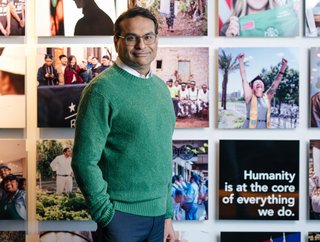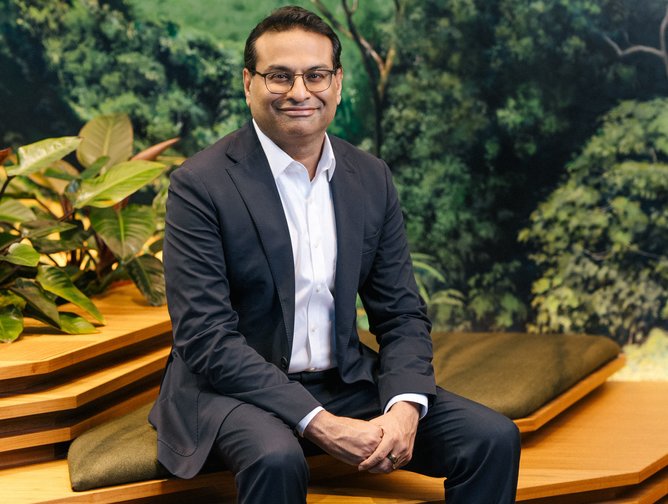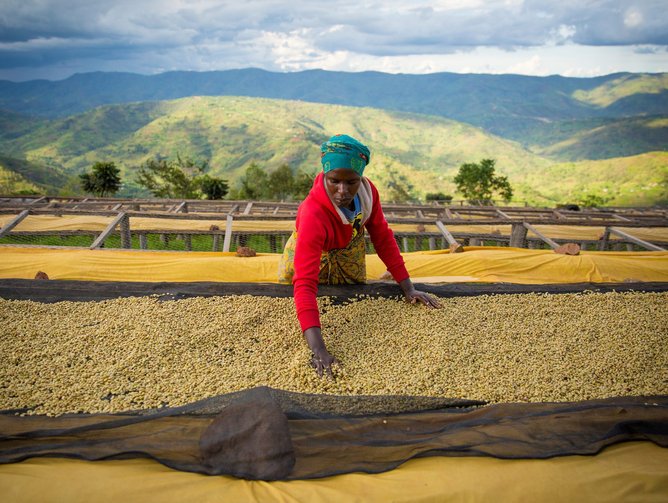Starbucks: balancing sustainability goals with rapid growth

Here’s a conundrum – how to balance global expansion of the world’s biggest coffee chain and US$100 billion business while also becoming more sustainable.
It’s far from an easy task when you are a company as ubiquitous as Starbucks, and one best tackled after a stiff cup of the black stuff.
Which is why Seattle's most famous export is adopting what it calls the Triple Shot Reinvention with Two Pumps strategy. Launched in November 2023, the aim is to focus on ‘elevating the Starbucks brand, strengthening the company’s digital capabilities, and becoming truly global’. The ‘two pumps’ are unlocking efficiency and reinvigorating partner culture.
This Reinvention concept was introduced by founder Howard Schultz at the company’s Investor Day in September 2022. Since then, Schultz has stepped aside, with Laxman Narasimhan taking over the role of CEO in April 2023.
The strategy sets out a roadmap for how the company will deliver long-term, sustainable growth and deliver significant returns to shareholders.
Before taking the helm, Narasimhan spent five months immersing himself in the company, working in more than 30 stores, visiting manufacturing plants and support centres globally, and even earning his barista certificate.
Clearly Narasimhan is committed to the cause, but what does the Triple Shot Reinvention actually look like, and how does sustainability fit in?
Here are the aims for the three pillars of the concept:
- Elevate the brand through better run stores, growing the portfolio with more purpose-defined stores and accelerated renovations, and driving further product innovation
- Strengthen and scale digital by doubling its 75 million global Starbucks Rewards Members within five years and expanding digital and technology collaborations to elevate the partner and customer experience
- Become more global by accelerating store expansion to 55,000 globally by 2030

Aside from those three priorities, Starbucks also has three main areas where it is trying to be more sustainable.
Investing in Partners
By partners, Starbucks means employees, and the company says it has a deep commitment to diversity, equity and inclusion (DEI). Wage increases, training and equipment upgrades also account for US$1 billion of investment in 2022.
Caring for Communities and the Planet
Starbucks says it is responsible for building a more sustainable, equitable and resilient future, within a deep commitment to human rights, ethical sourcing and giving more to the planet than it takes. In 2022, 3,500 stores (around 10%) reduced carbon emissions, water usage and landfill use, while 98% coffee was ethically sourced and verified.
Advancing Equity and Inclusion
Work to advance DEI at Starbucks has already led to important progress but the company admits there is more to be done. DStarbucks has invested US$5 million in organisations serving young people of colour in the US, and achieved 100% scores on the Disability Equality Index and the Human Rights Campaign Corporate Equality Index.

How Starbucks is tapping into india and China
Becoming truly global certainly means expansion in the two most populous countries on the planet – India and China.
Starbucks just announced (January 2024) plans to operate 1,000 stores in India by 2028 through its joint venture with Tata Consumer Products Limited that launched in 2012. There are currently 390 stores across 54 cities, so this means opening a new outlet every three days.
Part of the ambitious schedule includes skilling local employees and promoting Indian-origin coffee to domestic customers and those internationally. India is in the top 10 coffee growing countries in the world, and accounts for about 3% of global production.
India is an increased focus for Starbucks as its economy is booming, and projected to become the world’s third largest by 2030.
According to the latest data from the IMF, the top 5 GDP countries in the world in January 2024 are the US, China, Japan, Germany, and India. While the US and China are considerably bigger than the rest (by a factor of at least 4 between Germany and China), India is not far behind third position.
Talking of China, in September 2023 Starbucks opened its China Coffee Innovation Park (CIP) – a first for the company – at a cost of around US$220 million.
The CIP was designed to be the company’s most energy efficient and sustainable coffee manufacturing and distribution centre globally, built based on LEED Platinum and China Green Building Three Star standards for carbon emissions, plus energy and water use.
It also boasts the most energy efficient roasting technology which helps to reduce emissions and energy consumption.
Around 20% of energy is generated by 26,000 square-metres of solar panels, and around 90% of waste is recycled.
“As one of the largest consumer markets in the world, China presents tremendous opportunities for Starbucks,” said Narasimhan. “The Coffee Innovation Park highlights Starbucks’ foresight in elevating the supply chain through digitalisation and advancing our sustainability agenda, enhancing our unique competitive advantage as we accelerate our global growth.”
China is Starbucks’ largest and fastest-growing international market and the CIP – located in Kunshan, near Shanghai – features not only a roasting plant for imported Arabica beans, but also packaging, storage and distribution capabilities to serve all Starbucks locations in China.
Longer term, the plan is to also source high-quality Arabica beans from China.

Starbucks states that it is committed to becoming resource positive – giving more than it takes from the planet. This includes storing more carbon than it emits, eliminating waste, and conserving and replenishing more freshwater than it uses in its soon to be 55,000 coffee shops (by 2030).
Some of those stores will be dedicated drive throughs and also pick-up only, which is one area where Stabucks is looking to leverage its powerful customer base and digital presence.
It’s worth dwelling on the fact that Starbucks is the world’s biggest neobank, with more than 28 million active customers (more than the 22 million that Chime has in second position).
But Starbucks is not a bank, I hear you cry. Check out these statistics. Back in 2018, more mobile payments were made via the Starbucks app (more than 23 million) than Apple Pay in the US.
Bearing in mind consumers can only pay for one thing (a delicious coffee) at one location (Starbucks) and it is still staggering to learn that in 2023 Starbucks was still the second most popular mobile payment system (with 31 million payments), second only to Apple Pay but ahead of Google Pay.
Then consider this – in Q4 2022, Starbucks was holding US$1.64 billion of customer ‘deposits’ in the form of pre-paid accounts and gift cards. That is essentially an interest-free loan for Starbucks to leverage, and in 2022 some US$212 million was unused or unclaimed, so straight into the coffee giant’s coffers.
No wonder Starbucks sees sense in expanding its leading digital position as part of its Triple Shot Reinvention.
We’ll drink to that.
*******************
Make sure you check out the latest edition of Sustainability Magazine and also sign up to our global conference series - Sustainability LIVE 2024.
*******************
Sustainability is a BizClik brand.






